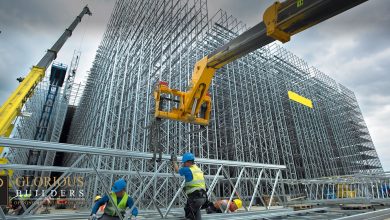What Are the Core Duties of a Construction Equipment Operator?

Construction equipment operators are essential members of large teams on busy construction sites. These individuals operate, drive and maneuver heavy machinery, such as cranes, pile drivers, back-hoes, bulldozers, front-end loaders, and graders. This machinery is used to construct and maintain the world’s most important infrastructure, including roads, bridges, airports, tunnels, and gas and oil pipelines.
Handling one of the most labor-intensive jobs, construction equipment operators are responsible for coordinating machine actions, inspecting and reporting malfunctioning equipment to supervisors, and abiding by stringent safety precautions.
In these roles, individuals might also be responsible for maintaining and repairing the equipment they are operating. It may also be necessary to learn hand signals to help you communicate with your team members on a loud job site. However, the physical effort and attention to detail are rewarded with good pay and great benefits.
The field of construction operation is broad and abundant with various positions that call for skilled, energetic, and physically strong individuals. Some equipment operators control machines that spread asphalt or concrete on roads, pavements, and other structures. To spread concrete and asphalt evenly, great attention to detail and manual dexterity comes into play. Concrete paving operators must be able to control the flow and temperature of concrete distributed to structures. On the other hand, pile-driver operators use heavy equipment mounted on cranes, skids, or barges to hammer heavy concrete, wood, or steel beams to the ground. Such large piles bring support to walls, buildings, and bridges. Lastly, operating engineers work primarily with power construction machines and bulldozers. Such loading machines are equipped with shovels, gravel, earth, and other materials. At times, they also drive trucks or tractors and operate air compressors, pumps, and other types of power equipment.
How to Become a Construction Equipment Operator
Heavy equipment operators are hired by various organizations, including local construction companies, utility companies, city or municipal governments, oil and gas companies, and timber and mining operations. Typically, most operators will begin working with a construction crew to gain experience and enroll in a company training or apprenticeship program simultaneously. Union and state apprenticeships are available to students with minimal experience, offering on-the-job and classroom training. Such opportunities provide more practical training than schools as students learn to use and operate different machines and equipment.
Depending on the company, employers might be looking for someone with a high school diploma or GED, a clean driving record, and an active commercial driver’s (CDL) license. Education or training via an apprenticeship or vocational school can also help your prospects.
Potential employers may also look for individuals who can accurately interpret plans, lift heavy objects (often up to 50 pounds), understand safety guidelines, have excellent vision or use prescribed lenses, and have exceptional dexterity. Working with heavy and expensive equipment requires heightened safety awareness and competency. Equipment operation errors could result in serious injury, costly damages, and health and safety fines. With heavy equipment operation comes great responsibility, and that is why those who succeed in this field have incredible depth perception, physical stamina, and quick reaction times.
The Work Conditions for Construction Equipment Operators
Heavy equipment operators work in various environments, but they are almost always outdoors, where conditions can often be hot and harsh. The sites where these team members work can often be loud, and there is an inherent danger to working on any construction site. The value of obeying all safety rules and regulations is indispensable in such dangerous settings. Employees who go to work daily with safety protocols in mind rarely risk being injured or contributing to an accident.
Finally, construction equipment operators must sometimes be willing to work overtime when the job calls for it. For example, a project may run behind schedule or be delayed due to bad weather. Some construction sites require burdensome work that can last twenty-four hours, but the payment is usually worth the effort. Work can be seasonal or full-time in remote locations.
Is a Construction Equipment Operator Job Right For You?
If you are looking to find a job as a construction equipment operator, the first step is to pull together your resume that summarizes your experience and/or education as well as your skillset, such as keen hand-eye coordination and the ability to follow directions.
76% of resumes with unprofessional emails get rejected, so before you send it off, make sure someone else has given your resume a copy edit. Also, be sure that you are sending it with a professional email stating your interest in the job. Construction equipment operators might be destined for cumbersome work, but professionalism, dedication, and ambition are also crucial elements hiring managers will likely consider.
The job of a construction equipment operator is a great one if you are interested in working with your hands on a team. It might feel like moving mountains, but the valuable relationships, teamwork, and community contribution are worthwhile endeavors. If you’re looking for a rewarding career in this field, then being on the lookout for construction companies hiring near you will expose you to various opportunities.





